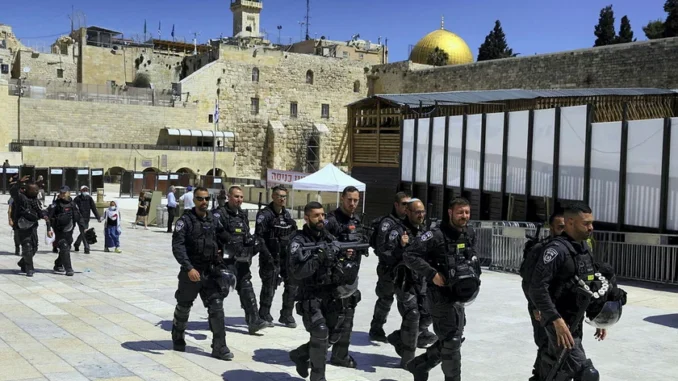T. Belman. I am told that the criticism by Arab peace partners of how the IDF handled the riots, should not concern us. They are with us. Only Jordan really meant the criticism. That also should not concern us as time will tell.
With the Temple Mount now at the epicenter of tensions, Israel fears violence might spill over to the Gaza Strip
By Amos Harel, HAARETZ Apr 18/22

Israeli security forces on the Temple Mount on Friday.Credit: Ohad Zweigenberg
Nearly a month since the beginning of the current wave of terrorism, the security situation still seems unstable. The focus of the current friction is Jerusalem, and the Temple Mount in particular. The danger of full-scale eruption there, which could hover over the city throughout the week and perhaps throughout the current Muslim holy month of Ramadan, could also cause a larger, regional conflagration.
The circumstances in Jerusalem are also sensitive because this year the holidays of the three religions coincide, attracting a particularly large crowd of Jewish, Muslim and Christian worshipers. On Friday morning, when Israeli soldiers burst into the Al-Aqsa Mosque after hundreds of young Arabs gathered inside the mosque and threw stones in the vicinity, it appeared for a moment that the situation was close to spiraling out of control. But in the end, the police carried out mass arrests without causing serious injuries among the rioters, and the midday prayers proceeded without interruption.
The police spokesmen’s frequent pleas to journalists to show subsequent pictures of calm on the Temple Mount demonstrates the degree of concern among the police and political leadership over a possible uncontrollable escalation. In addition to regular incitement by Hamas and calls for violence in the territories on social media, the extremist influence of the northern branch of Israel’s Islamic movement is also prominent, and its members are involved in the violence on the Mount.
On Saturday morning, the incidents resumed there, this time against the backdrop of attempts by Muslims to prevent Jews from entering the Temple Mount esplanade. In the morning, police neglected to secure some of the routes leading to the Western Wall, resulting in the stoning of buses and injuries to seven Israeli passengers. On the other hand, video clips were publicized from Friday showing police hitting Palestinian residents with clubs. Clearly the many incidents in the Old City are causing nervousness in the Muslim world.
Jordan’s King Abdullah has called on Israel to stop provoking Muslims and to calm the situation in Jerusalem. Palestinian President Mahmoud Abbas called on the United States to intervene in what is happening on the Mount.
In the face of criticism from neighboring countries and the frequent attacks on him by the Knesset opposition, Prime Minister Naftali Bennett is taking a tough public line. On Saturday, at the end of a situation assessment with defense officials, he announced that the political leadership was giving the security forces “a free hand for any action that would provide security to the citizens of Israel.”
But in practice, Bennett is also working to calm things. It may be a bit early to say so decisively, but in recent days it seems the scope of the Israeli army’s arrests in the West Bank has been reduced. And the most important decision on the Israeli side – by Defense Minister Benny Gantz, on the recommendation of security officials and with Bennett’s backing – was not to impose a closure on the territories during the intermediate days of Passover.
The government purportedly could have had a convenient excuse: For many years, Israel closed off the territories during the entire holiday, without regard to the level of tension there. But this time it’s the opposite, and that involves a considerable gamble: Palestinian workers will continue to cross into Israel’s pre-1967 borders as usual, at least as long as there are no further terrorist attacks.
When it comes to the danger of this spreading to other areas, the immediate suspect, as usual, is the Gaza Strip. In the situation assessment, the possibility was raised that a Palestinian faction – Islamic Jihad or someone from one of the smaller organizations – could decide to fire a volley of rockets from the Strip in a gesture of identification with Jerusalem or in response to the many fatalities from IDF operations in the West Bank.
In light of the tension, Israel’s air defense radar network appears to be set at maximum sensitivity. That might be the background for the false alarm on Sunday afternoon along the Gaza border. Hamas restraint until now, which is also keeping other organizations from firing, follows heavy pressure from the Egyptians.
Yet the longer clashes in Jerusalem and the West Bank continue, and certainly if they intensify, the harder it will become to prevent rocket fire from Gaza at Israel.



Leave a Reply
You must be logged in to post a comment.